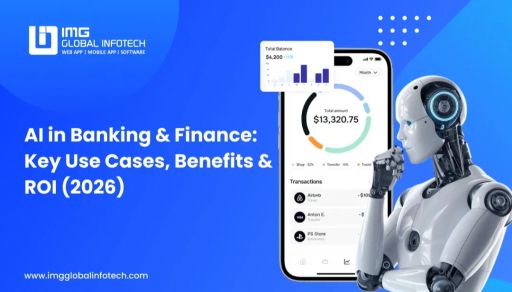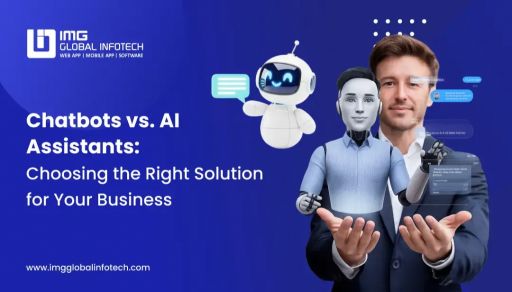How AI Is Transforming E-commerce: Personalization, Automation & Growth
Neeraj Rajput
Jun 17, 2025

Artificial Intelligence (AI) is rapidly innovating the e-commerce industry, changing the way businesses are conducted and how customers shop online. AI is enabling smarter, faster, and more efficient shopping, from personalized product suggestions to automated customer service using chatbots. AI in e-commerce brands to understand customer behavior, optimize product pricing, manage inventory effectively, and create customized marketing campaigns in real-time. As the online retail industry's fight for customers becomes more crowded, there is a necessity to allow businesses of any size to adopt AI in e-commerce to work more efficiently, navigate brand loyalty by improving the user experience, and grow in countries where nations are moving increasingly to digital. In this blog, we are going to share the essential ways in which e-commerce is revolutionizing itself, which is why it will be the foundation of the next generation of e-commerce success stories.
Related Post - A Complete Guide To ECommerce App Development 2026
How AI is Ideal for the Business of Online Retail?
Artificial Intelligence (AI) is fundamentally changing the face of e-commerce in many ways, including enhancing customer experiences and providing the intelligence needed to form more agile backend operations across every aspect of the e-commerce ecosystem. Here are eight significant ways AI has been changing the game when it comes to online retail:
Personalized Product Recommendations.
AI algorithms implement neural networks to consider customers' previous behaviors and preferences, recommending products tailored to each user's purchase history. This personalization is preferable as it enhances customer satisfaction, engagement, and conversion.
Smart Search and Navigation
AI in e-commerce improves search capabilities through natural language processing (NLP) and image recognition. Consumers can find products using visual searches or voice commands, making the experience more accessible and easier to use.
24/7 Customer Support Using Chatbots
AI chatbots are available 24/7 to assist customers with information, respond to their questions, and provide support throughout the purchase process. This is in addition to the customer service representatives that humanity will undoubtedly need, but AI Chatbot cost are made for savings versus all human services.
Dynamic Pricing
AI in e-commerce enables retailers to adjust product prices using real time pricing while monitoring conditions in the market, competitor pricing, and demand-based trends. This helps retailers to develop competitive strategies in real-time that allows for an increase in profit opportunity.
Inventory and Supply Chain Optimization
AI in ecommerce will support retailers with supply chain and inventory-related activities by predicting the range from demand to inventory levels when seeking through fluctuations to identify potential disruptions to their supply chain. aid with these activities and support supply chain and inventory management as it relates to retailer stock planning, increased accuracy in reducing waste, and overall better opportunities and timing of delivery.
Fraud Detection and Prevention
Fraud detection and prevention are becoming more sophisticated with new AI systems that examine patterns in customer services and transactions to detect unusual activity that may suggest fraudulent behaviour. When we find fraudulent activity at a relatively early stage, we are in a better position to address it and hinder further activity, increasing the safety involved with transactions occurring between businesses and consumers.
Customer Behavior Analytics
AI in e-commerce can provide better insight into customer journeys, preferences, and what triggers purchasing (among other areas of information) to assist firms in creating promotions or marketing strategies that will support retention of customer lists.
Virtual try-ons and AR integration
AI and augmented reality (AR) enable customers to try things on virtually, whether that be clothing, glasses, or home furnishings. Customers are using immersive experiences where they get the best of both online and brick-and-mortar shopping.
Also Read - Ecommerce App Development Cost
Ways that AI is Reshaping E-commerce
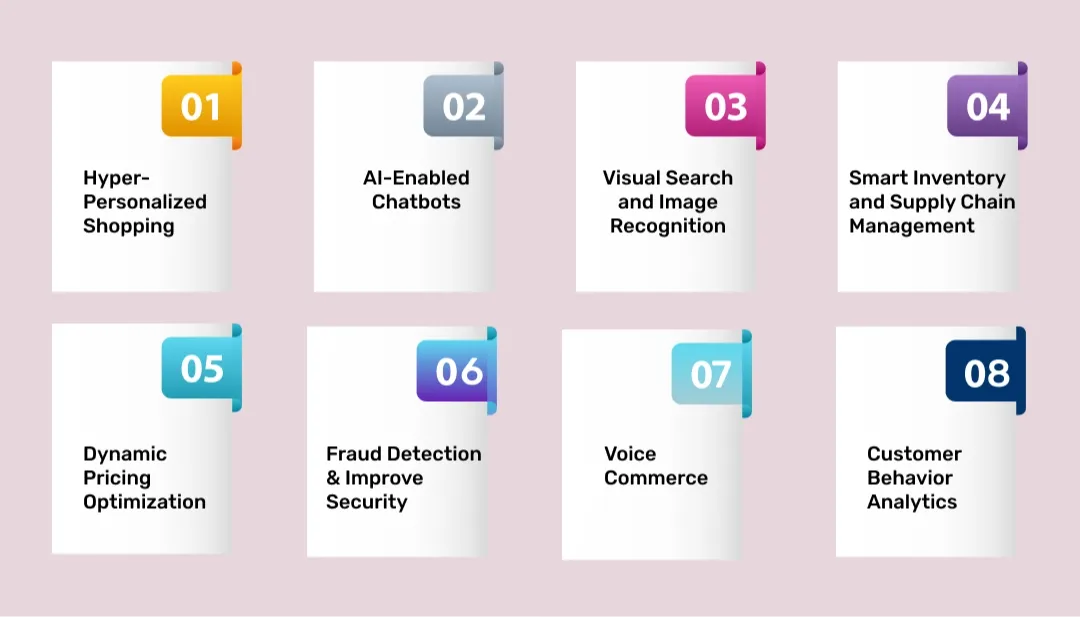
Hyper-Personalized Shopping
The use of user data - such as browsing history, prior purchases, and what kinds of products users have shown interest in, AI uses all of that data to create highly customized shopping experiences. The ability to offer product recommendations, use customer lists with email automation to mass customize email campaigns, and add on AI capabilities to a customer engagement program lets retailers really connect with their customers in a new way and ultimately, increase their bottom line.
AI-Enabled Chatbots
Smart chatbots engage customers with the capacity to answer questions, order processes, and issue resolution 24/7. AI in e-commerce is creating an excellent customer service experience while minimizing wait times while also taking away labor costs for these e-commerce vendors.
Visual Search and Image Recognition
AI in retail is also useful for visual search, it offers users the ability to upload an image and contemporarily find products that are similar. This is helpful for product discoverability, mainly because it shortens the purchase path while enhancing customer engagement.
Smart Inventory and Supply Chain Management
Predictive analytics powered by AI allows eCommerce Development to assist them with stock management where they are able to see demand trends and use analytical tools and predictive analytics to see bottlenecks in their supply chain practices. If e-commerce vendors and platforms can work through overstocking, which means not being overly at risk, their inventory should allow them to ISP, have a very low risk of stockouts, and they can enhance the management of their logistics.
Dynamic Pricing Optimization
AI in e-commerce algorithms can act immediately for any incidents since it is constantly monitoring market trends, competitors pricing, and analyzing customer behaviors to change prices on the fly. This can give you competitive pricing, the ability to maximize profit, and the ability to adjust accordingly with market changes.
Fraud Detection & Improve Security
AI for e-commerce is giving an additional layer of security over today's technology when it comes to understanding social behaviors, which allows sellers to identify and stop fake payments, fraudulent reviews, and account takeovers, giving customers more trust and an extra layer of security on transactions.
Voice Commerce
By using AI in e-commerce, businesses will have voice search options and voice purchases through voice assistants, including Alexa and Google Assistant. Voice shopping gives younger customers the ability to gain access to information quickly, and on a mobile device hands-free form, and is quickly becoming the more popular option.
Customer Behavior Analytics
AI for e-commerce allows vendors to understand customer behavior deeply, providing businesses with useful insight into considering customer preferences, predicting future customer behavior, and helping to adjust marketing style to customers preferences.
Read This Next - How Much Does It Cost To Build An ECommerce App Like The Home Depot?
Benefits of Using AI for E-commerce Business
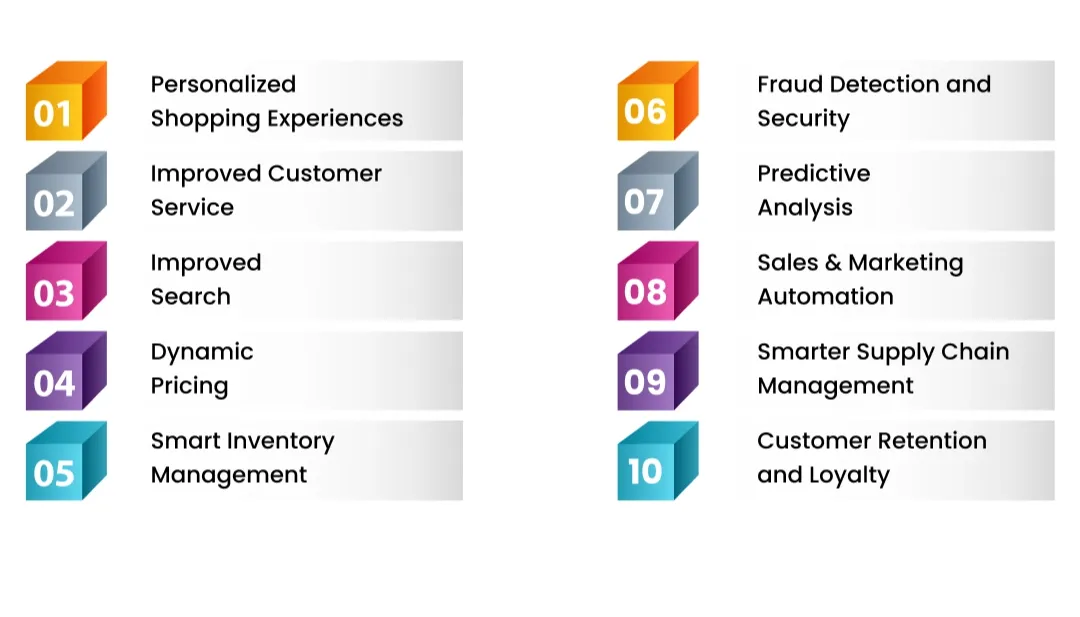
Personalized Shopping Experiences
Artificial intelligence in the retail sector gives real-time personalization by looking at customer behavior, preferences and past purchases to make relevant product suggestions, thus increasing customer engagement and purchase likelihood.
Improved Customer Service
AI chatbots and virtual assistants provide 24/7 customer support and have the ability to chat with multiple customers simultaneously. They are present to answer customer inquiries and solve their problems, which in turn reduces response times, resolve times, and improves the customer experience.
Improved Search
Artificial intelligence in e-commerce will also improve searches on the Marketplace Ecommerce Development added functionality like voice searches and visual searches provide customers with a more intuitive way of finding products more convenient and quickly to improve their overall experience on the site.
Dynamic Pricing
AI technology used in e-commerce uses consumers buying behavior, market trends, competitor pricing, and demand fluctuations to set prices in real-time. The pricing is competitive while maximizing profits, yet utilizing data to ensure buyer trust. A small retail store that tests its pricing could lose customers to a large chain that is investing more in new technology, where it may be worthwhile to change, when it provides a better return immediately.
Smart Inventory Management
AI tracks and forecasts demand patterns before automating stock levels and restocking. Making it convenient is how businesses can actually maintain good inventory levels, avoid overstocking or stock shortages, and manage operational costs; people can be a burden.
Fraud Detection and Security
AI ml in e-commerce systems use machine learning algorithms to identify suspicious activities and patterns. Identifying synchronized patterns where you identify pure bookings establishes a more secure identity and not just money laundering and fake transactions; this is the best investment. Don't invest in bad security.
Predictive Analysis
AI is much better and faster at predicting future trends and customer behavior. This allows businesses to identify and enable data-driven decisions when discerning their marketing, inventory, and product development plans, which increases their return on investment.
Sales & Marketing Automation
Using AI in e-commerce systems involves automated email marketing campaigns, ad targeting, lead scoring, etc. And ensures that you always deliver the right marketing message, to the right audience, at the right time.Pairing AI with a bulk email finder can further enhance these efforts by helping identify and reach verified leads more efficiently. In no time, you will see an increase in sales.
Smarter Supply Chain Management
AI predicts demand, tracks shipments, and reports supply chain bottlenecks. Smarter logistics helps to ensure that you are always following timelines and reducing lost revenue.
Customer Retention and Loyalty
AI-powered Hire Ecommerce Developers systems observe and analyze churn signals and user engagement. Based on this data, you can determine and implement appropriate loyalty programs and personalized offers. You can also determine the best remedies to drive customer engagement and increase their customer lifetime value.
Also Read - How Much Does It Cost To Build An App Like Flipkart?
The Future of AI in E-commerce
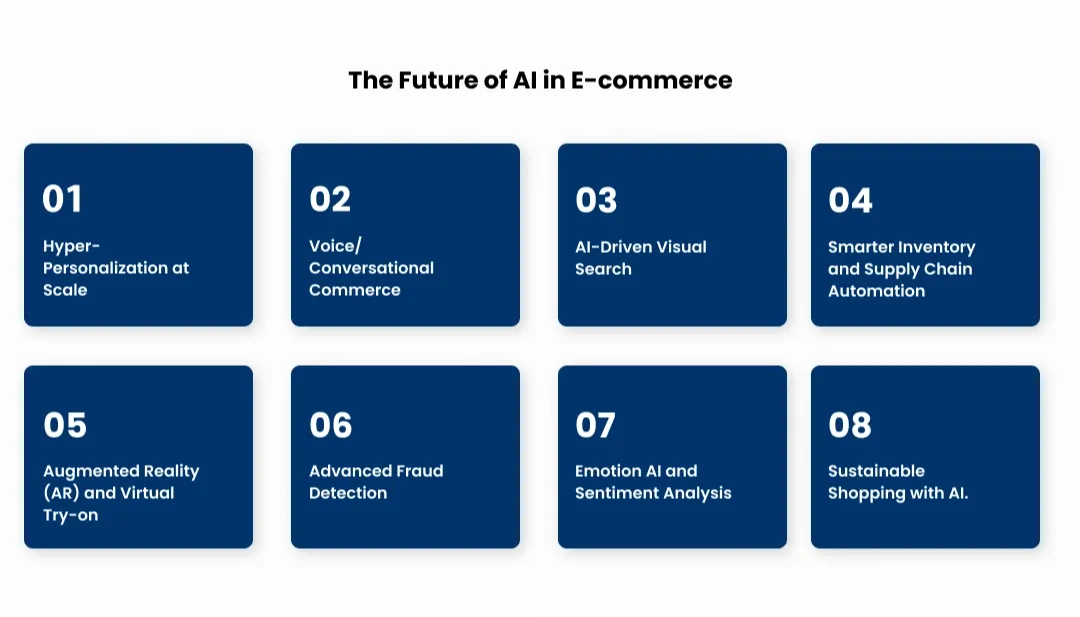
Here is a list of amazing future trends of artificial intelligence in the retail industry.
Hyper-Personalization at Scale
Future artificial intelligence in retail industry systems will offer even more advanced personalization by monitoring real time data across all points of contact. This will include specifically curated product recommendations, personalized homepages, and customized marketing campaigns for every shopper.
Voice/Conversational Commerce
As voice assistants proliferate, generative AI in retail will allow for seamless voice-driven shopping, where customers will scan the internet, compare products, and place orders by using natural language, making the purchase process easier and faster.
AI-Driven Visual Search
New advances in visual recognition will allow users to search and shop using images instead of keywords. Many shoppers will be able to upload their pictures, and in seconds, AI for shopping will identify and provide reasonably similar products back to users.
Smarter Inventory and Supply Chain Automation
Artificial intelligence in retail will further improve inventory management accuracy by understanding shifts in demand, automating orders, and reducing wasted dollars. Extremely integrated supply chains powered by AI will be able to deliver faster and with greater accuracy.
Augmented Reality (AR) and Virtual Try-on
Retail AI solutions combined with AR will allow customers to virtually try on clothing and accessories and visualize furniture in their own homes, combining the benefits of personal in-store shopping with the conveniences of online shopping.
Advanced Fraud Detection
AI in shopping will develop to detect more subtle forms of fraud. Given the ability to monitor, analyze, and learn from user behavior in real time, demands on future AI-powered e-commerce will create better resources that protect against advanced cyber threats.
Emotion AI and Sentiment Analysis
The future of tech is AI in e-commerce because AI is progressively learning how users feel through voice, text, or facial signals, enabling brands to empathize and personalize experiences on a much deeper level.
Sustainable Shopping with AI.
AI retail solutions will help consumers make greener choices by calculating product sustainability, sourcing, and environmental impacts to support conscious consumerism.
Related Post - How To Create A Multi-Vendor Marketplace Like Amazon?
Why Choose IMG Global Infotech for AI-Powered eCommerce Solutions?
IMG Global Infotech focuses on providing the latest AI-powered eCommerce to improve your business. We deliver expert service using the latest technologies and market offerings like Advanced Machine Learning, Predictive Analytics, and intelligent automation for your users to improve the user experiences of your operation and increase your sales. From product recommendations to dynamic pricing AI chatbots, we keep your eCommerce store ahead of the game. With a commitment to innovation, scalability, and seamless integration, IMG Global Infotech designs the best e-commerce chatbots that help current businesses thrive in the digital-first world. Work with us to future-proof your success.
Conclusion.
AI is driving the transformation of the e-commerce industry to be smarter, faster, and customer-centric, facilitating experiences such as personalized shopping experiences, intelligent chatbots, optimizing inventory, and predictive analytics; using the best AI for e-commerce evolves the world of online retail. It empowers companies to have a greater understanding of their customers, provide a more streamlined operation, and drive greater sales on data-driven insight. Technology will keep changing, we will always be part of the future of e-commerce innovation - and will change how consumers shop and how businesses do business. Embracing AI is no longer an option; it's a necessity to keep competitive in the digital marketplace.
Neeraj Rajput is the co-founder of a leading IT company with over a decade of experience in technology consulting, product development, and digital transformation. With a passion for solving complex business challenges through smart tech solutions, he shares insights on innovation, leadership, and the evolving IT landscape




